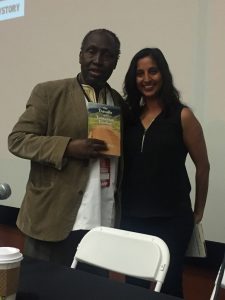-
Dictators as Gatekeepers for Europe: Outsourcing EU border controls to Africa
Dictators as Gatekeepers for Europe is a detailed journalistic account of how the EU is attempting to limit mobility within the African continent as a matter of the EU’s domestic policy agenda, hence the title hinting at the many agreements (with Turkey, Libya, Sudan) aimed at blocking migrants from approaching the European continent. The new “Berlin Wall” not only encircles Europe, but also generates a proliferation of militarised borders in Africa. …To summarise, the authors argue, Europe desires protected borders and open markets. The novelty is the amount of material that this book contains about African desires and strategies, both as a continent and as single states. This, in particular, makes the work a collection of extremely valuable directions of research. In fact, Africa, if one were to simplify the continent’s intentions, is depicted as aspiring to the exact opposite of Europe, namely open borders (with the African Union aspiring to free movement within the continent) and protected markets (protected from Western corporate predatory strategies). Moreover, contrary to the narrative of aid according to which the West “helps develop” Africa, the figures quoted by the authors suggest the opposite: while Sub-Saharan Africa receives $134 billion a year in development funding, $192 billions flow out of Africa, with $46 billion in profit for major corporations and another $35 billion vanishing in tax havens (218). https://www.law.ox.ac.uk/research-subject-groups/centre-criminology/centreborder-criminologies/blog/2022/02/double-book by Oana Pârvan.
The USA is divided around the wall President Trump wants to build along the Mexican border. Europe has long answered this question at its own southern border: put up that wall but don’t make it look like one.
Today the EU is trying to close as many deals as it can with African states, making it harder and harder for refugees to find protection and more dangerous for labour migrants to reach places where they can earn an income. But this is not the only effect: the more Europe tries to control migration from Africa, the harder it becomes for many Africans to move freely through their own continent, even within their own countries.
Increasingly, the billions Europe pays for migration control are described as official development assistance (ODA), more widely known as development aid, supposedly for poverty relief and humanitarian assistance. The EU is spending billions buying African leaders as gatekeepers, including dictators and suspected war criminals. And the real beneficiaries are the military and technology corporations involved in the implementation.
Originally published as Diktatoren als Türsteher Europas: Wie die EU ihre Grenzen nach Afrika verlagert.(Ch. Links Verlag, 2017), this English translation includes updated materials and analyses. Accompanying video at https://www.dw.com/en/the-gatekeepers-of-europe-outsourcing-border-controls-to-africa/av-45599271
You can read this book online for free.
Translated by: Lydia Baldwin | querzaehlen and Emal Ghamsharick
Europe delegates, shameful as it is, its dirty work on migration to African States, some of which hasten to endorse this role with servility. They hope to stay in the race and be treated on an equal footing with a Europe … In a word, colonization is draped in new clothes, but its consequences are the same as ever for people, for women, children and men who sometimes have no other way out than to flee a daily life that kills them. This is an important book for understanding these conditions.
– Mireille Fanon-Mendes-France, Frantz Fanon Foundation/Fondation Frantz Fanon
Migrants die of thirst in the Sonoran desert, drown in the Mediterranean, are murdered by gangs in Libya and Mexico, and disappear forever in doomed journeys that leave no trace. When we speak of immigration policies in rich countries today, we are really speaking about complicity in mass murder. This study brilliantly exposes how so-called liberal governments in Europe are outsourcing the violent repression of migrants to authoritarian regimes in the Middle East and local tyrants in Africa.
– Mike Davis, writer, political activist, urban theorist and historian; Professor Emeritus, University of California, Riverside
This book makes a depressing reading for any concerned African by clearly exposing how often European leaders and opinion makers continue to portray African migration with a mix of disdain, fear, racism and backward arguments. A unique contribution.
– Prof. Carlos Lopes, Nelson Mandela School of Public Governance, University of Cape Town and African Union High Representative for Partnerships with Europe.
-
The Travails of a Tanzanian Teacher
The Travails of a Tanzanian Teacher is a riveting account of the bumpy first decade of the work life of Karim F Hirji, a retired Professor of Medical Statistics. Filled with a distinctive variety of eye-opening episodes, it covers lecturing at the University of Dar es Salaam, the life of a political exile in a remote rural area and the challenges of setting up from scratch a one-of-a-kind educational institute in Africa. With a style that seamlessly combines the personal with the general, Hirji provides an illuminating description of different aspects of the Tanzanian political, educational, economic and rural landscape during the 1970s. Starting with a commentary on teacher training, he concludes with a critical comparison of modern university education in the nation with that of the earlier era.
A clearly written, excellently illustrated, valuable and absorbing reflection upon a rich lifetime in teaching that deserves an international audience. Richard Pring, Emeritus Professor at the Department of Education, and Emeritus Fellow of Green Templeton College, University of Oxford.
The remarkable life of a principled Tanzanian educator told with emotion and humor. Peter Lawrence, Professor Emeritus of Development Economics, Keele University UK and Lecturer in Economics, University of Dar es Salaam, 1970-72.
Karim Hirji’s account of four decades of teaching in post-colonial Tanzania is a timely call on teachers to: “educate in ways that will promote equality and social justice”. Dr Anne Harley, Paulo Freire Project, Centre for Adult Education, University of KwaZulu Natal, South Africa.
 Ngũgĩ wa Thiong’o with Rosa Hirji, holding a copy of The Travails of a Tanzania Teacher i.
Ngũgĩ wa Thiong’o with Rosa Hirji, holding a copy of The Travails of a Tanzania Teacher i. -
Tishio La Ukombozi: Ubeberu na Mapinduzi Zanzibar
Kitabu hiki kinaturudisha katika kipindi cha kusisimuwa cha miaka ya vita baridi, kipindi ambacho, sambamba na kipindi cha leo, madola ya kibeberu yamekuwa yakifanya njama za kubadilisha serikali zilizokuwepo na kuziweka madarakani zile zenye kufuata amri. Kwa kutumia kumbukumbu za picha za Johari, nyaraka za siri za Marekani na Uingereza, pamoja na mahojiano ya kina, kitabu kinatowa uchambuzi juu ya nafasi na satwa ya Chama cha Umma Party nchini Zanzibar na kiongozi wake mwenye upeo mkubwa wa mambo, Mwanamapinduzi mfuasi wa Itikadi ya Karl Marx, Abdulrahman Mohamed Babu. Kwa kuangalia kwa njia ya uwiano wa mifano inayokwenda sambamba ya wahka wa Marekani kuhusu Uchina ya Kikomunisti katika miaka ya 1960 na woga walionao hivi sasa kuhusu ushawishi wa Uchina, kitabu kinatafakari juu ya mivutano mipya iliyopo katika kupigania rasilmali za Afrika, kuundwa kwa kikosi cha AFRICOM, na jinsi Wanasiasa wa Afrika Mashariki wanavyoshiriki katika kuimarisha udhibiti wa Marekani katika nchi zao, na “Vita dhidi ya Ugaidi” katika ukanda wa Afrika Mashariki hivi sasa.
Now available from Mkuki Na Nyota Publishers, Tanzania: http://www.mkukinanyota.com
-
The great climate robbery: How the food system drives climate change and what we can do about it
USD $ 25.99The industrial food system is a major driver of climate change. Food sovereignty is critical to any lasting and just solution. The Great Climate Robbery shows readers how the industrial food system causes climate change, how food and agribusiness corporations are getting away with it and what can be done to turn things around.




